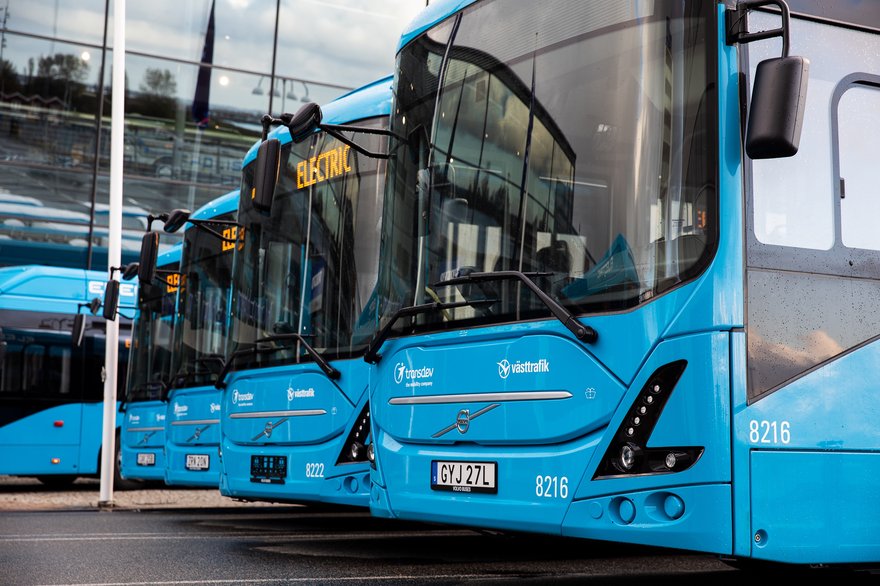The transportation industry is going electric as part of the broader push to cut emissions and go green.
And while much of the focus is on electric vehicle stocks, there is an opportunity to replace the world's massive fleet of more than 3 million buses with zero-emission alternatives. In Europe and in China, there are government mandates for 100% zero-emission bus fleets as soon as 2025.

There is a lot of potential business for companies that make electric buses, but also a lot of risk. For one, the engineering of electric propulsion becomes more complicated on larger vehicles because heavier electric vehicle batteries are required.
There is also the inevitable red tape associated with dealing with predominantly government customers. For young companies relying on government contracts for revenue, any delay can be an existential threat to the business.
For investors interested in buying into the potential, there are a lot of options. Some are stand-alone startups focused on electric buses. Other bus businesses are part of bigger manufacturers, offering less risk but potentially less upside if electric buses do take off.
6 Best Electric Bus Stocks for 2024
6 Best Electric Bus Stocks for 2024
| Company | Market Cap | Description |
|---|---|---|
| Volkswagen (OTC:VWAGY) | $73.6 B | Electric minibuses are a big part of this automaker's vision to be 20% electric by 2025. |
| Volvo Group (OTC:VLVLY) | $40.5 B | Industrial powerhouse has turned to electric powertrains ahead of government mandates. |
| Blue Bird (NASDAQ:BLBD) | $756 M | U.S. school bus mainstay that is increasingly turning its attention toward EVs. |
| Lion Electric (NYSE:LEV) | $468 M | Canadian public transit and school bus manufacturer. |
| Proterra (NASDAQ:PTRA) | $314 M | Early entrant to the municipal bus market that has built strong relationships with a lot of local governments. |
| GreenPower Motor (NASDAQ:GP) | $68 M | Canadian manufacturer of zero-emission buses and heavy-duty vehicles. |
1. Volkswagen
1. Volkswagen
Volkswagen is the world's largest automobile manufacturer, and it also makes a wide range of commercial vehicles, including small to mid-sized buses. The company, in part after being caught up in a scandal last decade involving its emissions reporting, has set a target of 20% of all vehicle sales, particularly electric cars, being electric by 2025.
The company's ID Buzz minibus is a big part of that push. Modeled on VW's iconic Beetle design, the Buzz is part of a range of electric vehicles designed to cover a wide swath of the individual and heavy-duty transportation market.
Volkswagen is a massive company with vast resources to put to work on electrification, giving it a potential leg up against newcomers. It is also investing in electric infrastructure, including battery producers.
2. Volvo
2. Volvo
This is the industrial Volvo, a maker of trucks, buses, and construction equipment -- not to be confused with the separate vehicle maker of the same name. Volvo has long been one of the leading providers of heavy vehicles powered by diesel engines, but the company is changing its product lineup in response to mandates from European government customers.
Volvo's 7900 series electric bus is a mainstay in many European cities. It is popular because it offers a variety of charging options, ranging from overhead powerlines to overnight recharging. The company has built strong relationships over time with a wide range of municipalities, giving it a clear advantage in the race to sell next-generation vehicles.
3. Blue Bird
3. Blue Bird
Blue Bird is the first name in school buses in the United States, an almost century-old company that makes most of the yellow buses you'll find transporting kids to school every day. But Blue Bird is not resting on its history.
The company was the first to manufacture electric school buses, with its first product rolling off the line in 1994. Today, Blue Bird offers 77-seat and 84-seat electric options. It also has a massive dealer network and an established financing arm to help it expand the business.
The case for Blue Bird electric buses is pretty straightforward; this company already has deep connections with the thousands of counties and school districts that have been buying its school buses for generations. As these schools move towards electric powertrains, it is only natural that Blue Bird will be near the top of the list of vendors they call.
4. Lion Electric
4. Lion Electric
Lion Electric is a Canadian manufacturer of zero-emission vehicles that is putting a heavy emphasis on the school bus market. The company offers a turnkey solution to customers, including providing buses, parts and maintenance, driver training, and advice on building the required charging infrastructure.
This is a massive potential market. In the U.S. alone, more than 480,000 school buses transport an estimated 26 million students daily. But given the limitations of local government budgets, it could take years for that potential to translate into sales. Lion is steadily growing its presence in the U.S., including offices in California and Illinois, in hopes of building the connections needed to boost its sales.

5. Proterra
5. Proterra
Proterra is perhaps the best-known electric bus startup. The company's vehicles have proven themselves over more than 40 million service miles dating back to 2004.
Proterra makes both school and transit buses as well as delivery trucks, shuttles, and coaches. It also markets its battery and powertrain technology to be used in commercial vehicles sold by larger automakers. Its energy business is set up to help municipalities make the leap to electric, including helping with financing, setting up charging infrastructure, and right-sizing the grid for a new generation of trucks and buses.
6. GreenPower
6. GreenPower
This company got started in 2010 and launched its first electric bus in 2014. GreenPower is developing a wide range of cargo and passenger vehicles, including cargo vans, shuttles, school buses, and even double-decker commuter transports. It also has a partnership with Workhorse Group (WKHS -0.12%) to help expand its distribution in the U.S. and as a supplier of electric chassis.
This is still a small company, and it comes with significant risks. But it could be an intriguing option for investors who can tolerate volatility and are interested in getting in on the ground floor of an emerging technology.
Related investing topics
Are electric bus stocks right for your portfolio?
Are electric bus stocks right for your portfolio?
Electric buses appear both inevitable and risky as an investment. In one sense, the entire globe is racing to go electric, and reducing bus emissions is an easy way to clean the air. On the other hand, there are a lot of very small and speculative companies chasing this goal, and it seems inevitable that not all of them will be successful investments.
Given the risks, the smaller, electric-focused companies are likely only a good fit for those with a high risk tolerance. But there are plenty of large, multifaceted manufacturers that offer less risk and should benefit as electric buses go mainstream. Investors can also gain some exposure to electric buses without significant risk by exploring some of the many transportation-focused exchange-traded funds (ETFs) that are available.
It is often said that an investment portfolio can be a reflection of an investor's vision of the future they want. There's reason for hope we are moving towards a world free of emissions-heavy buses. These stocks represent the companies that are helping that vision to become a reality.













